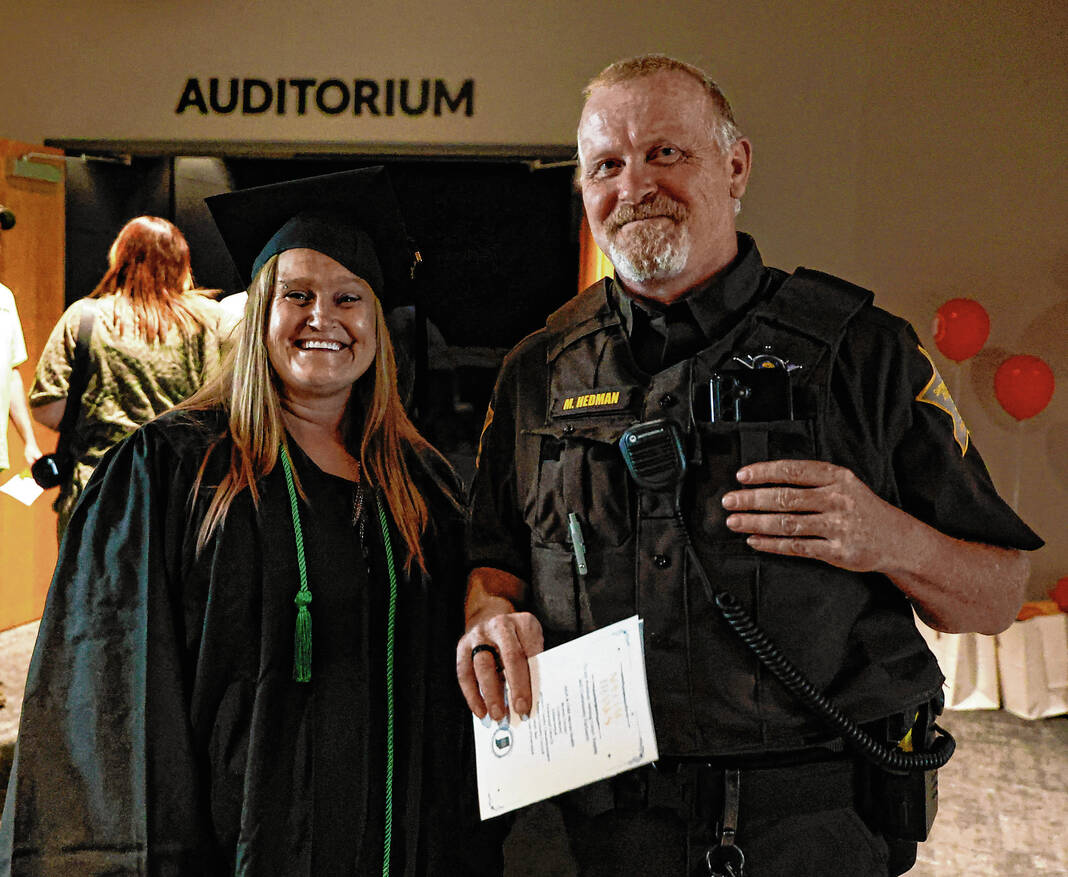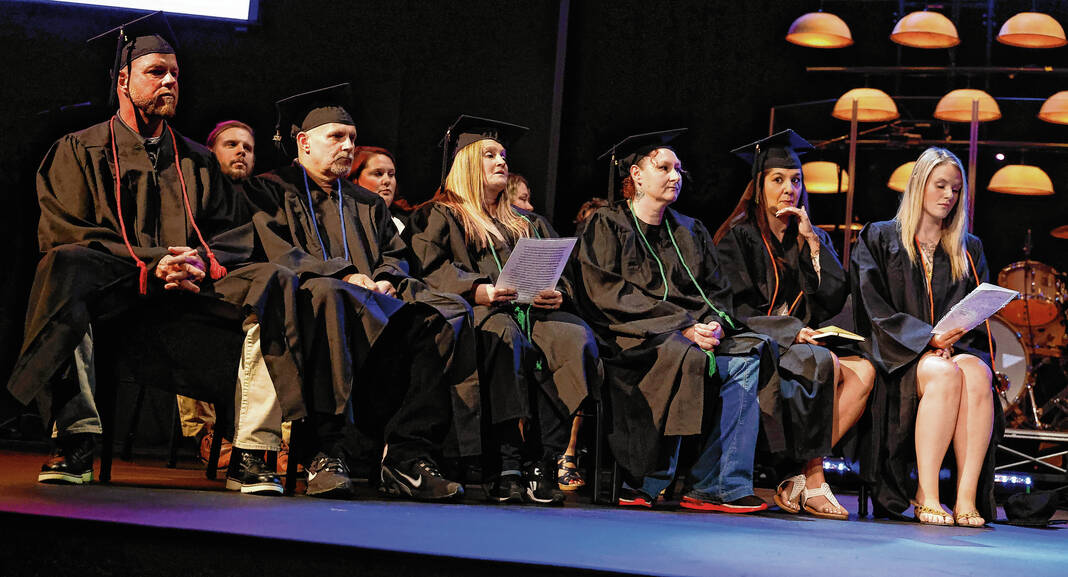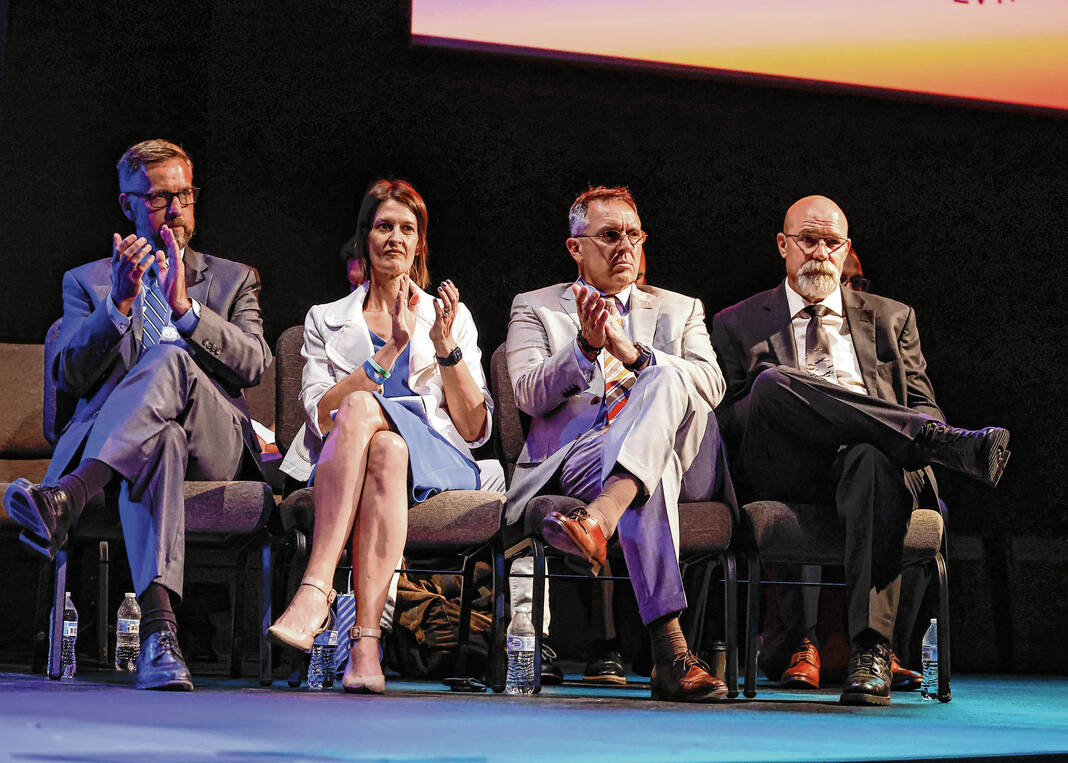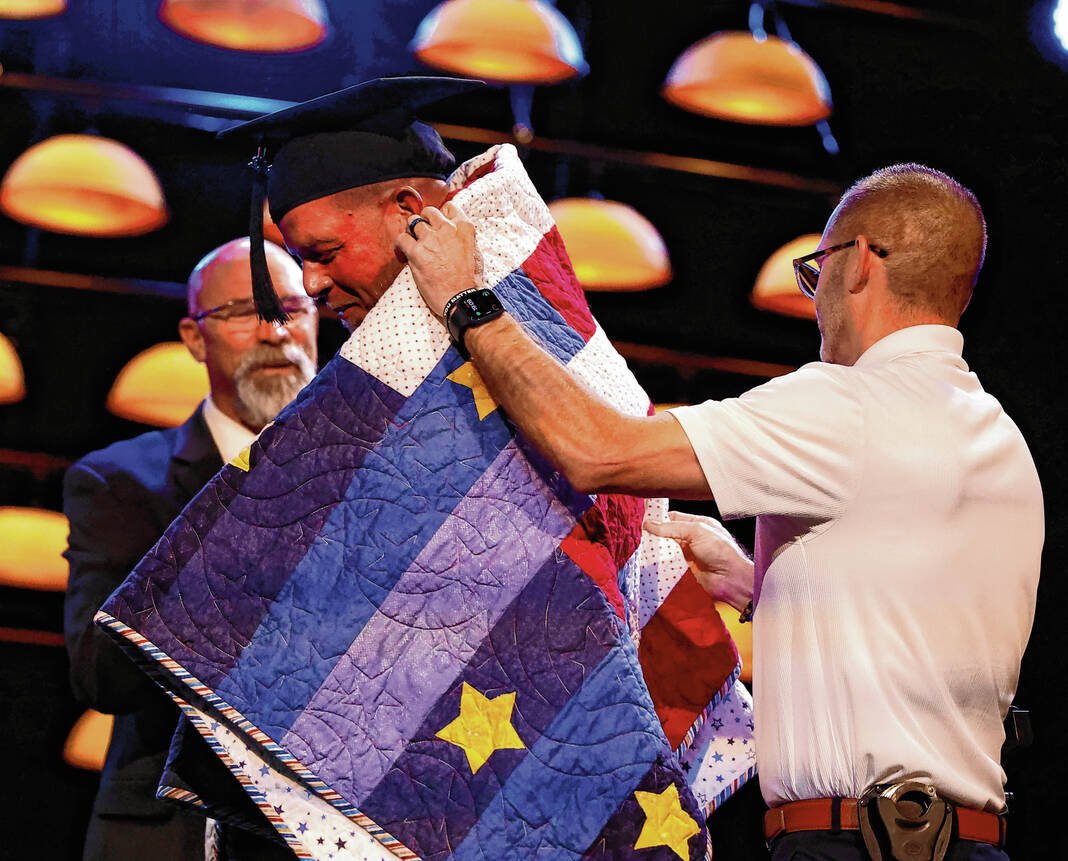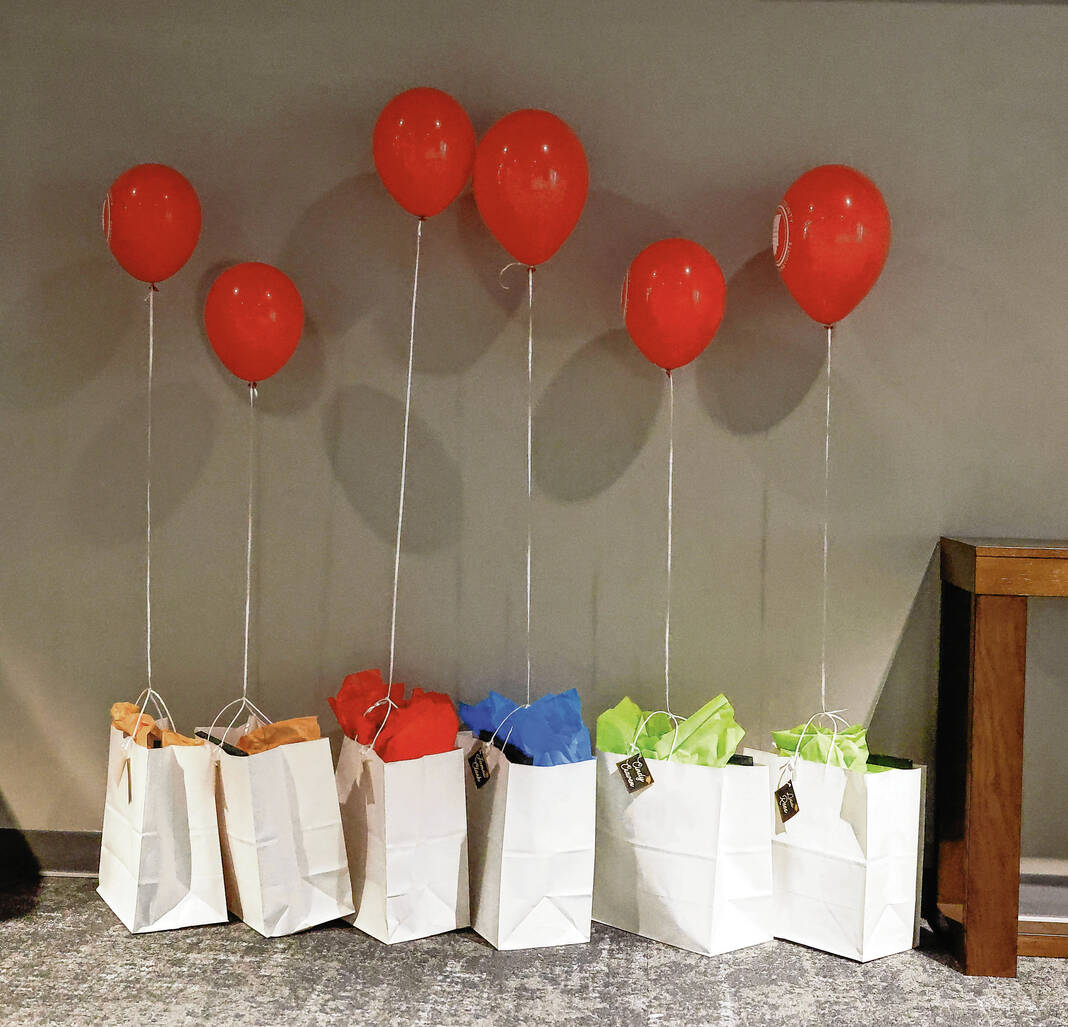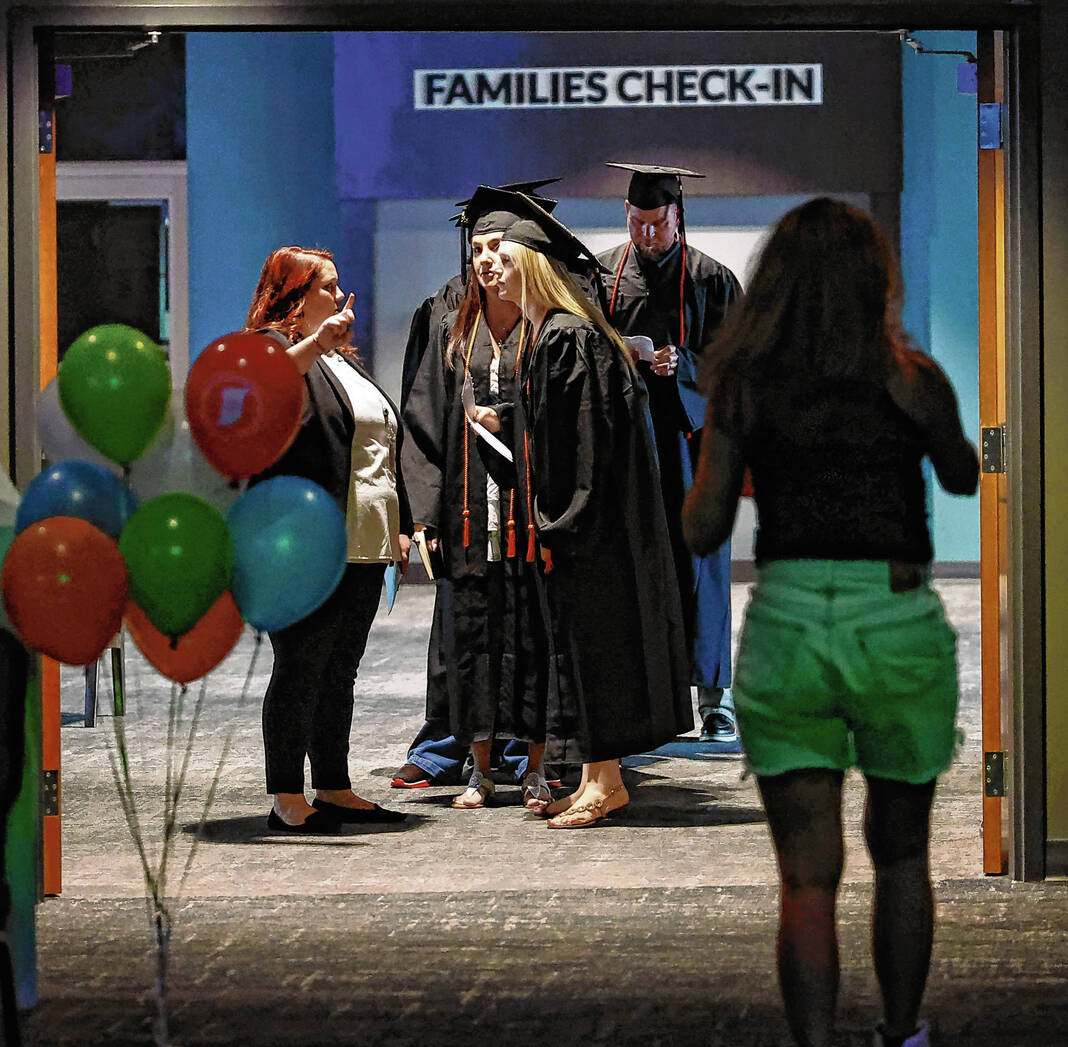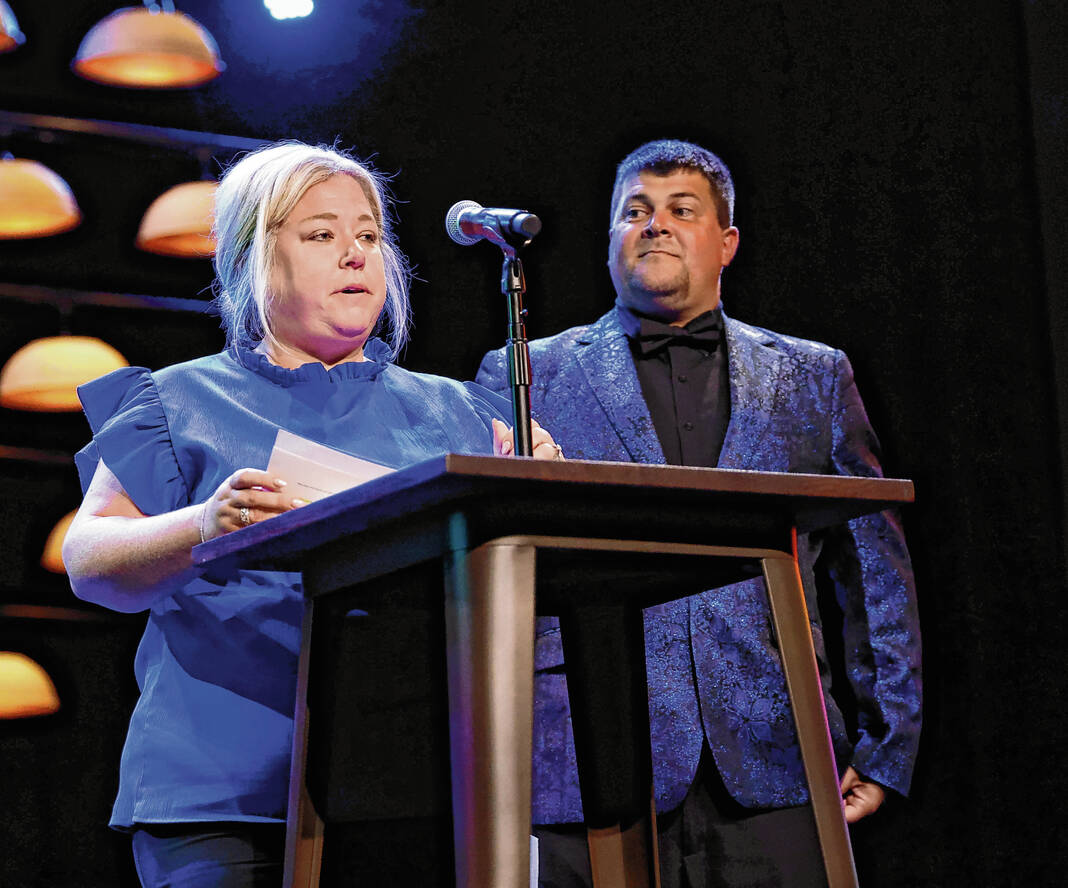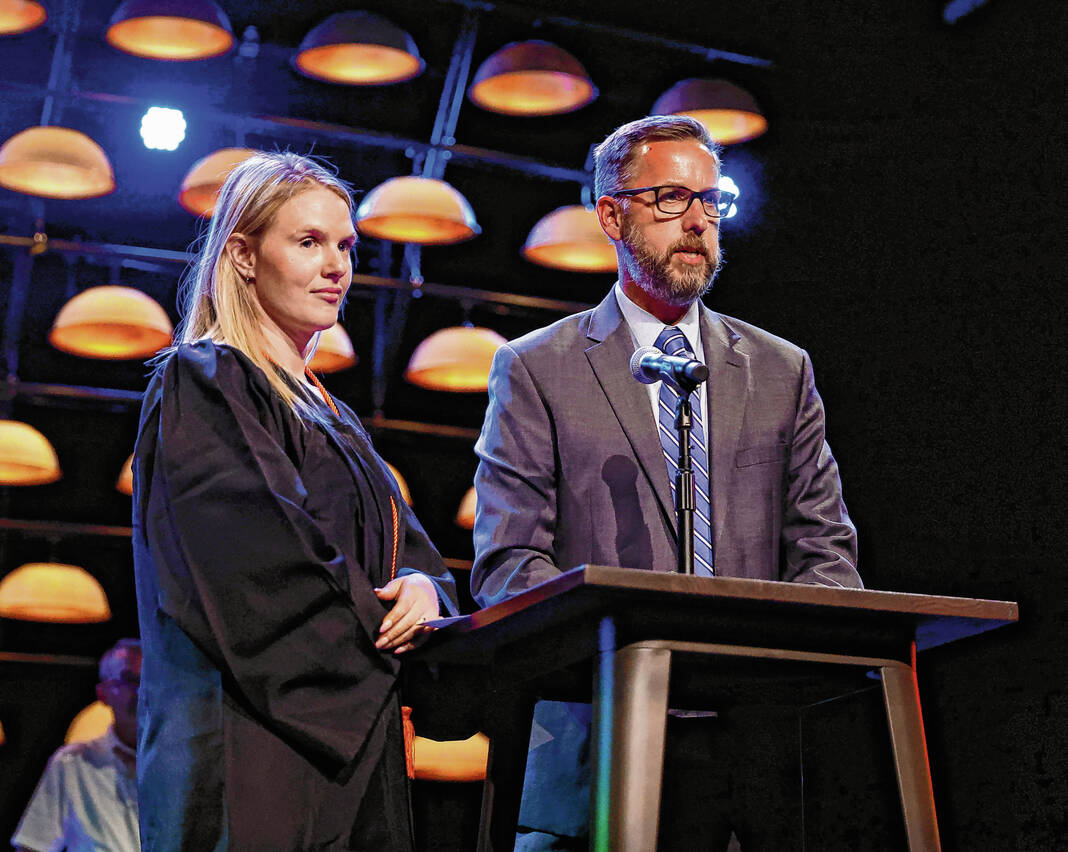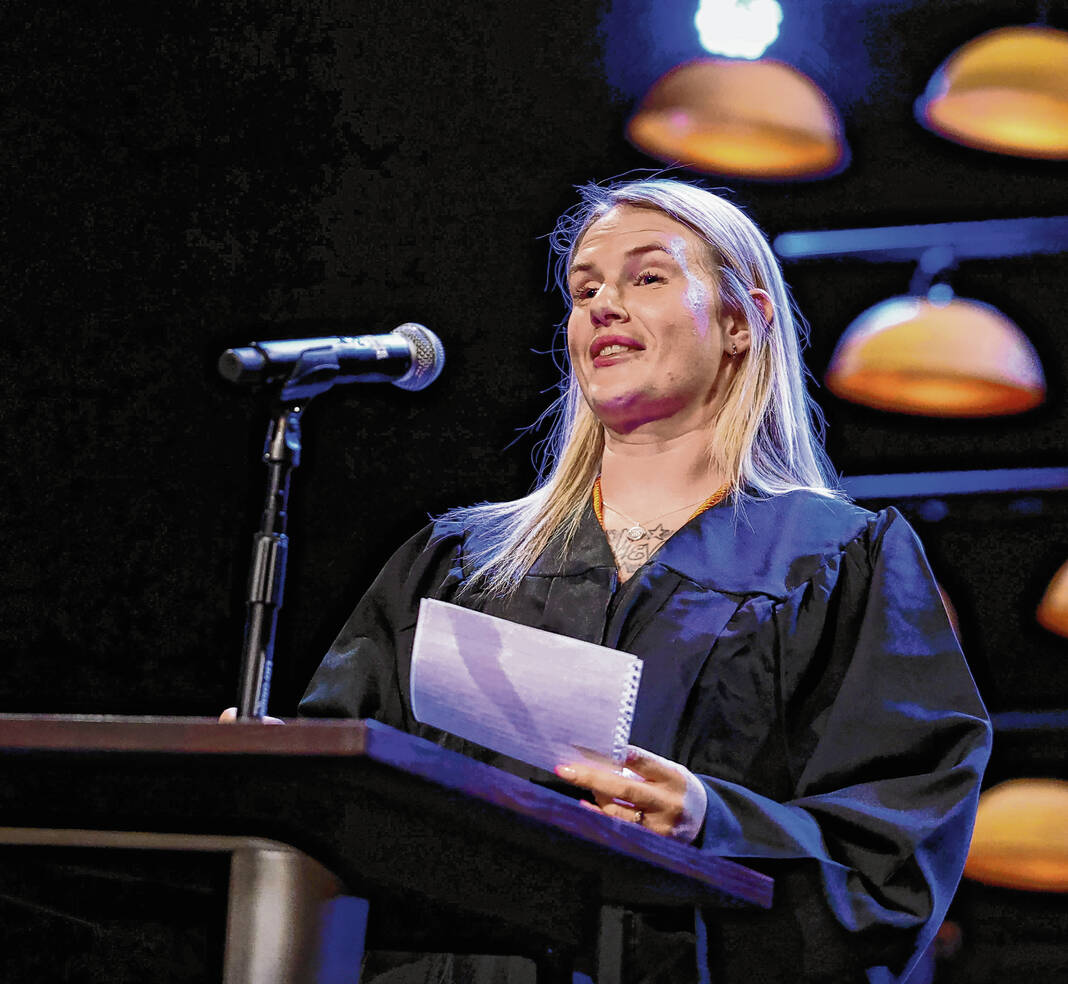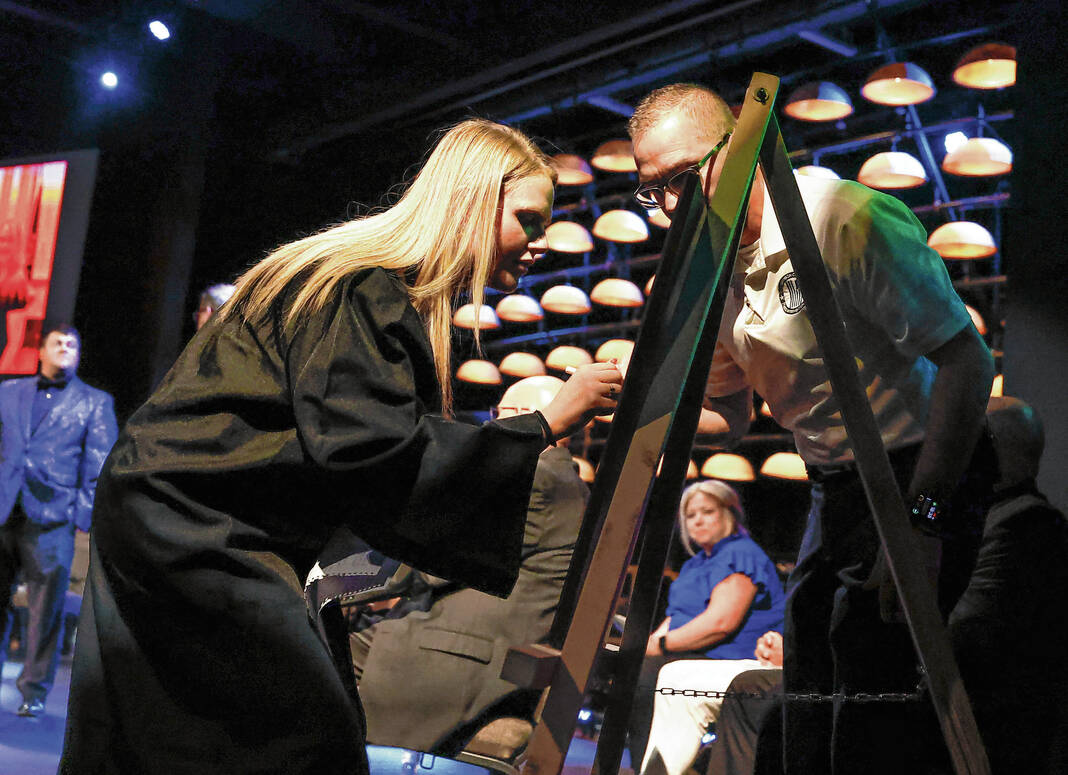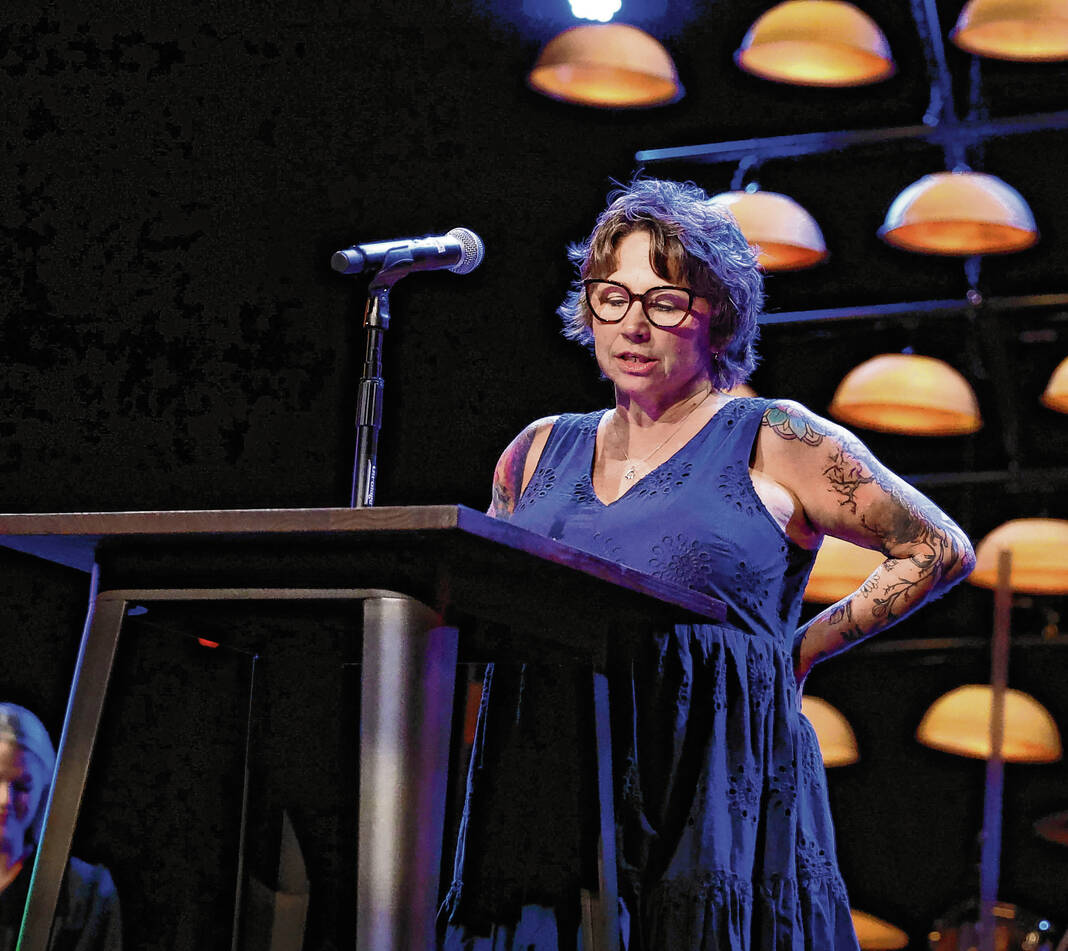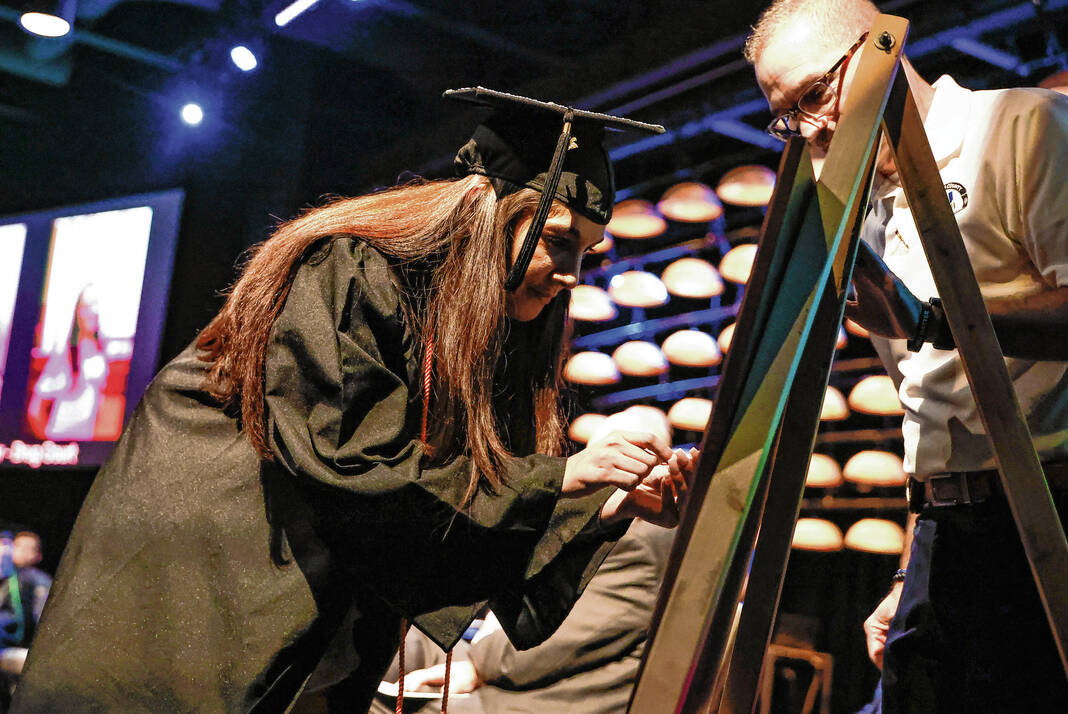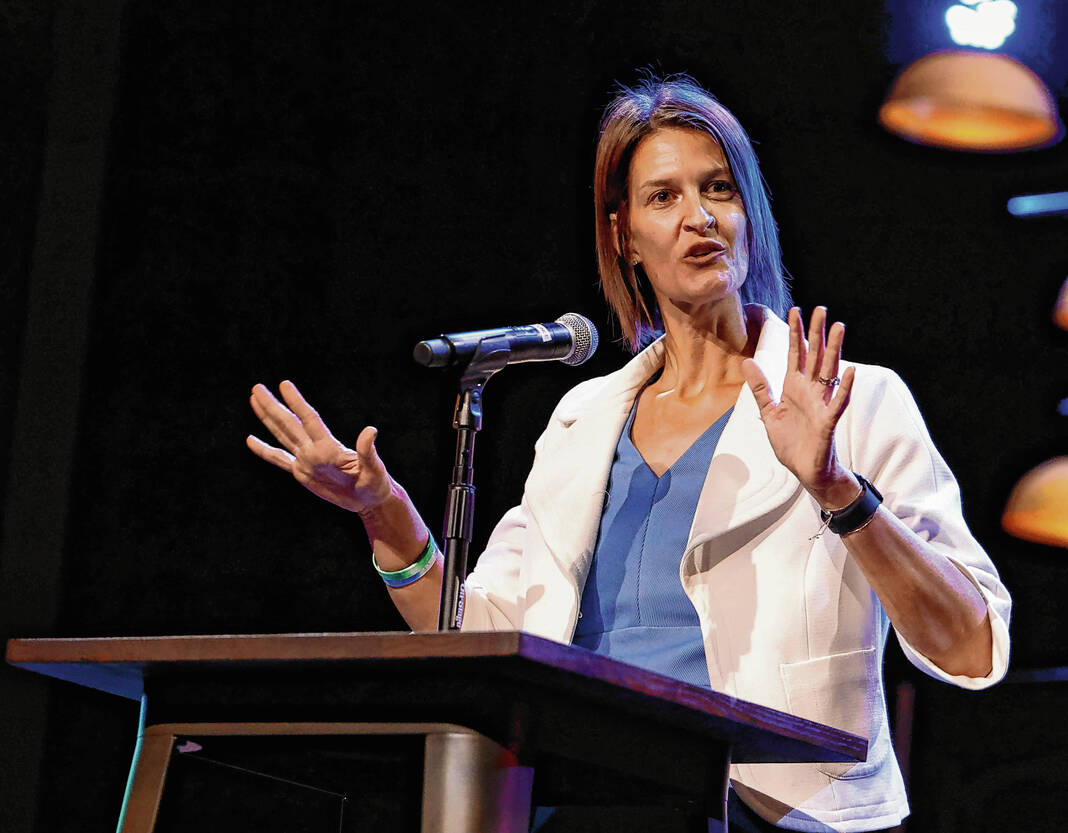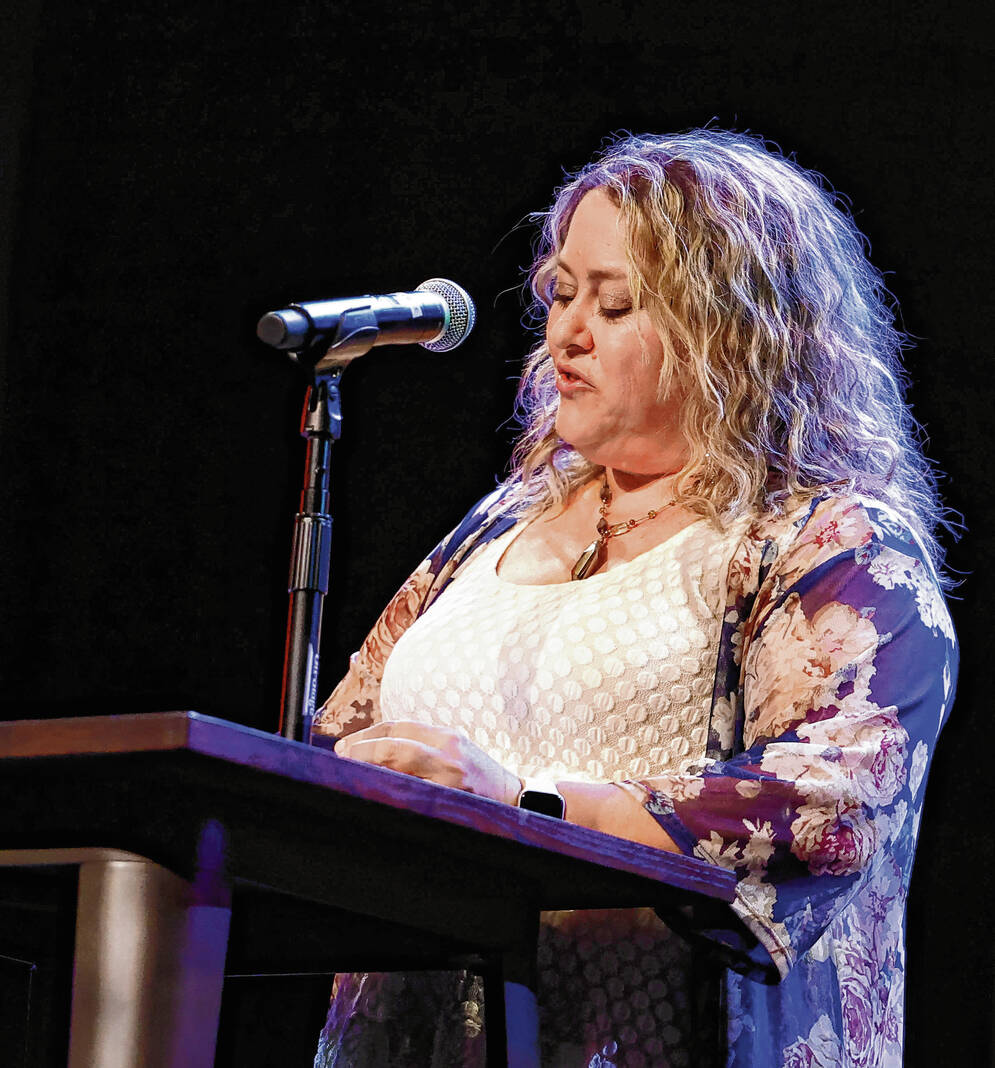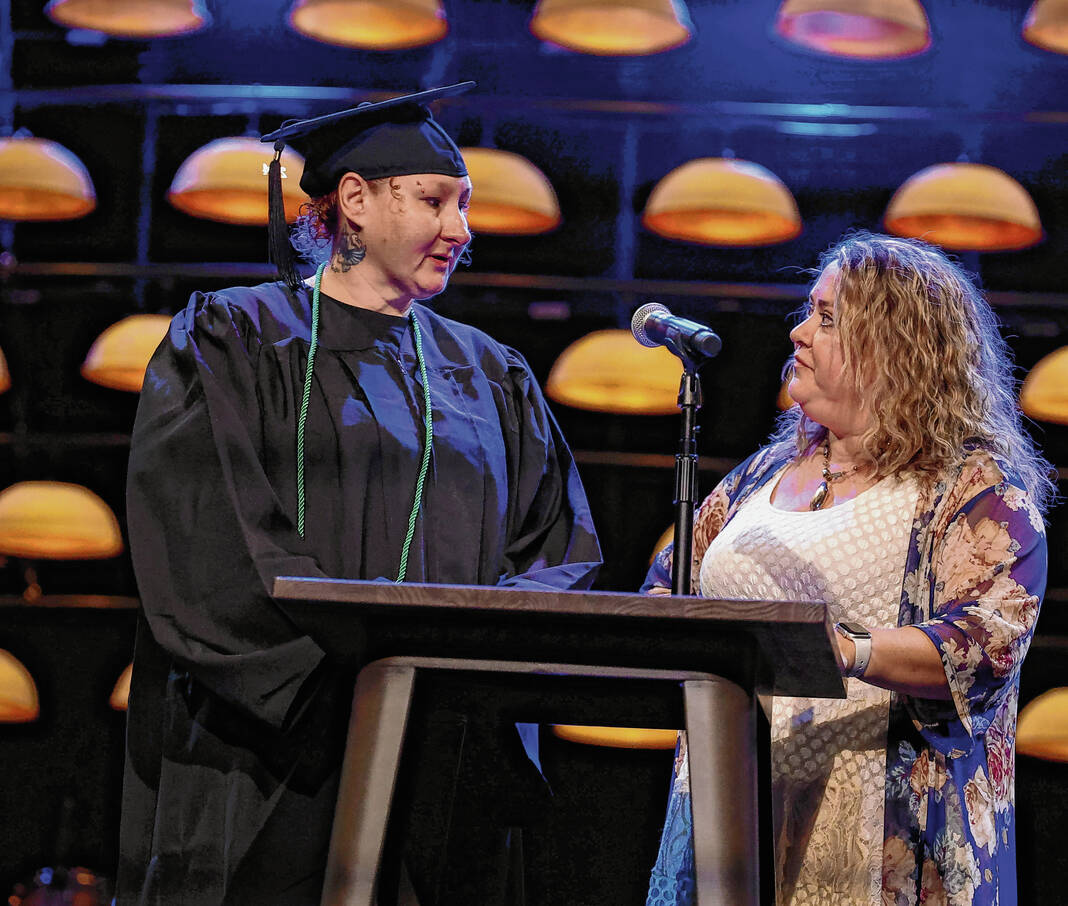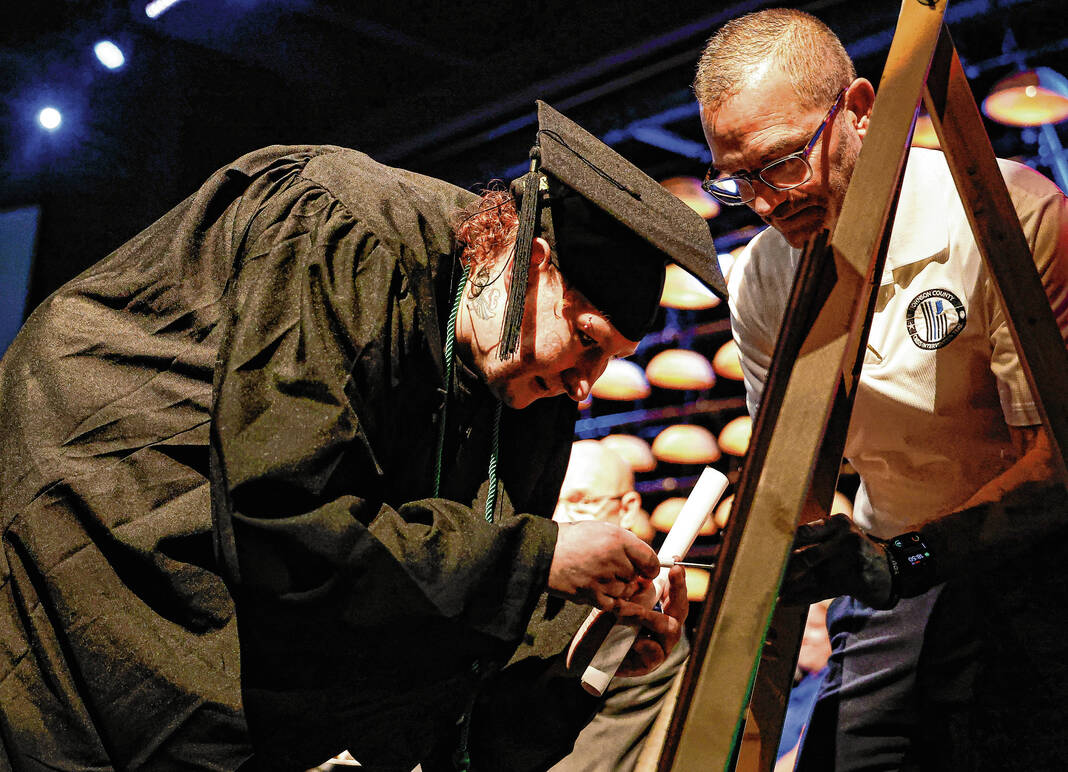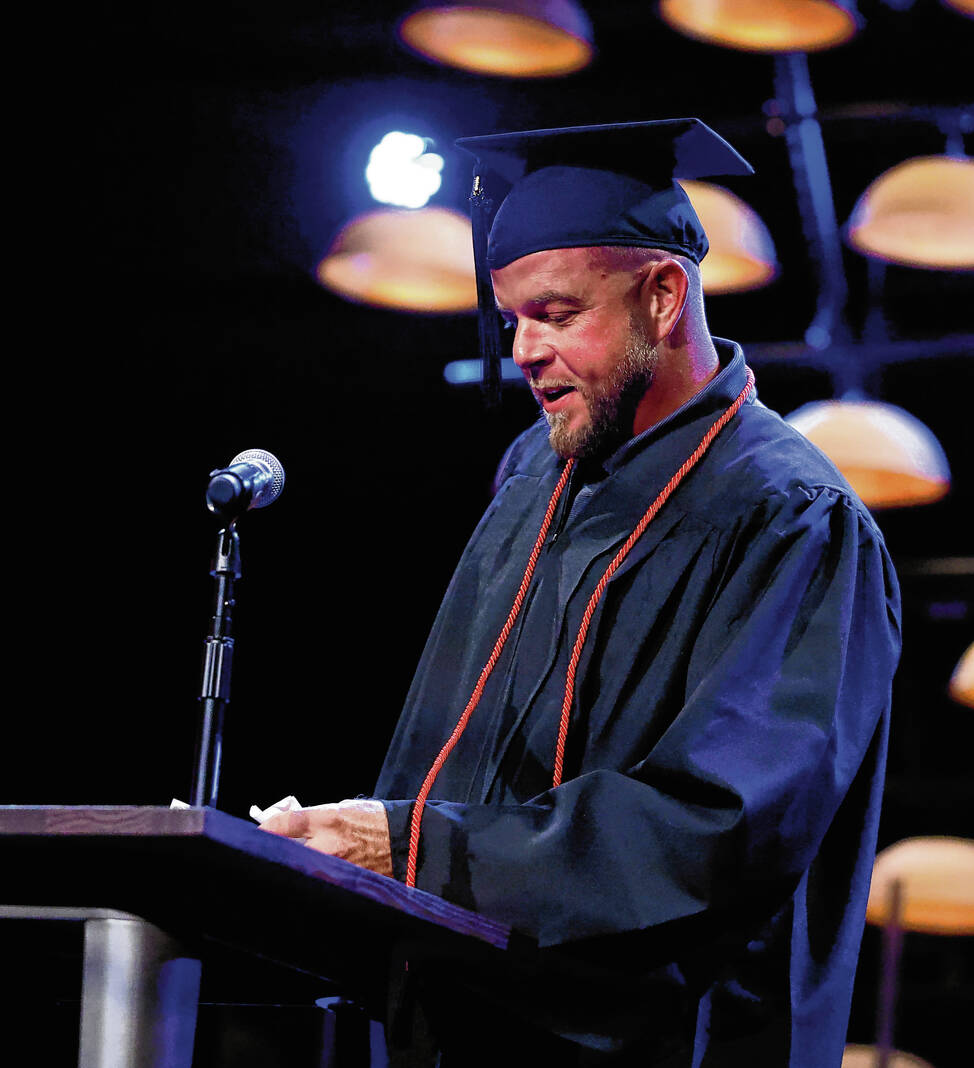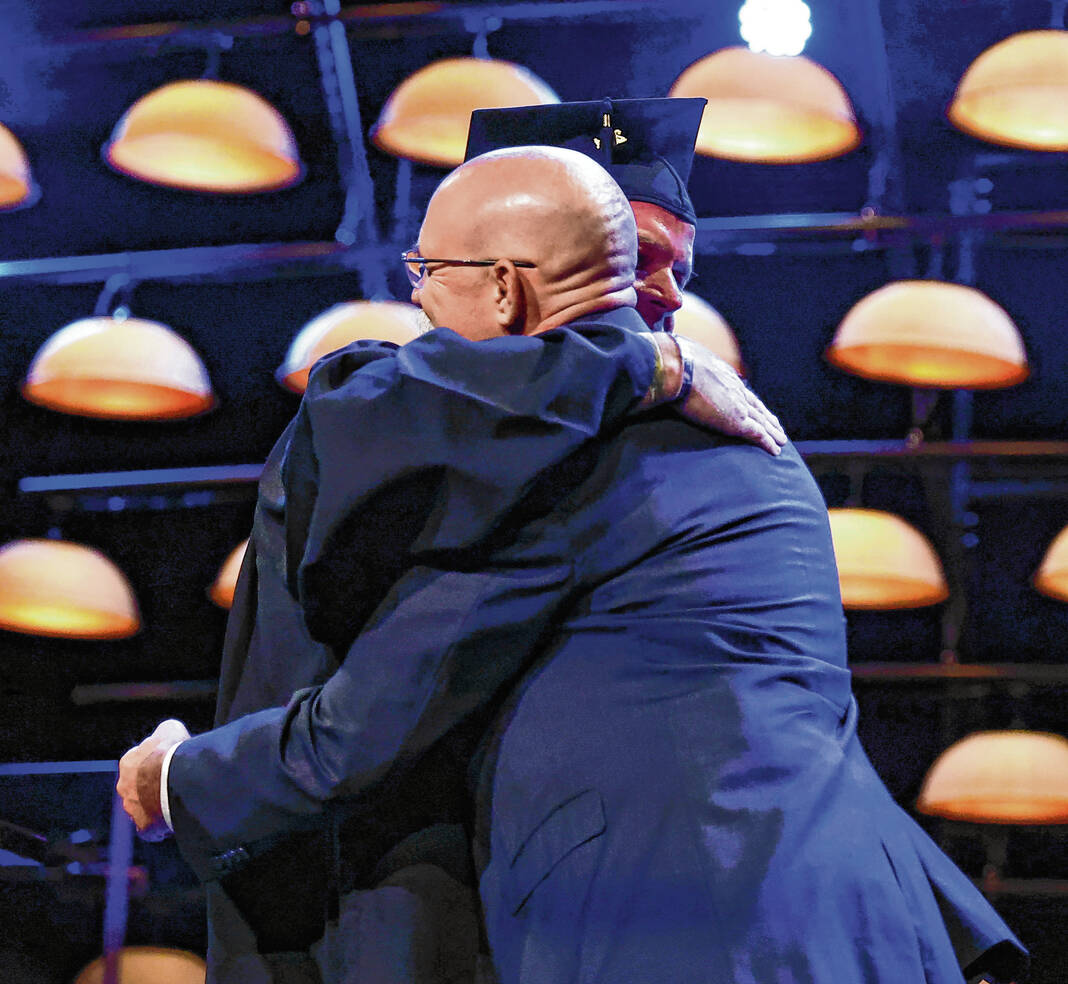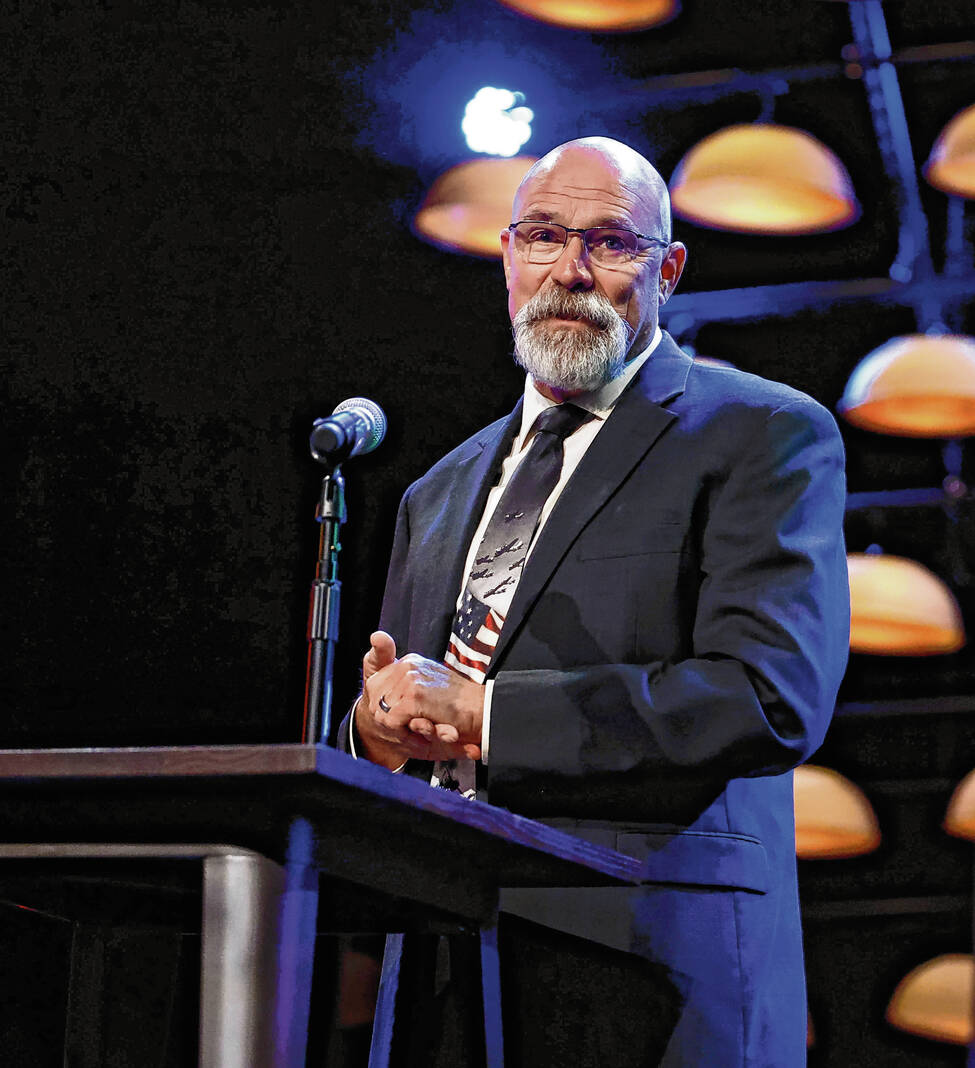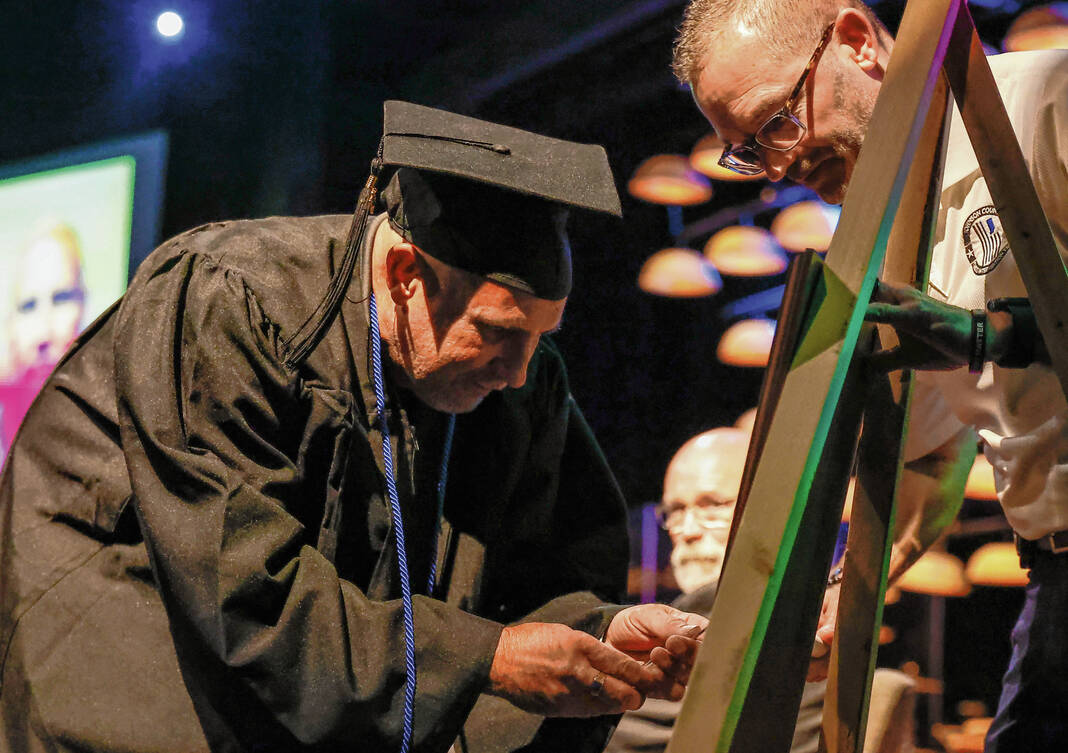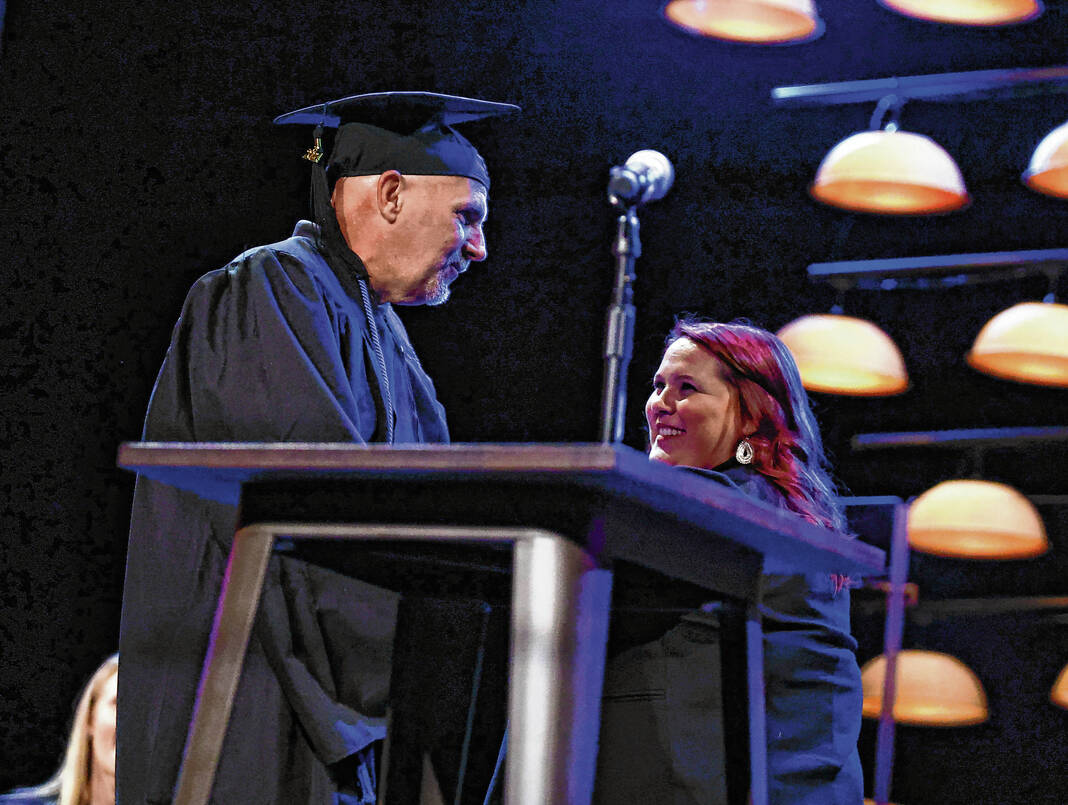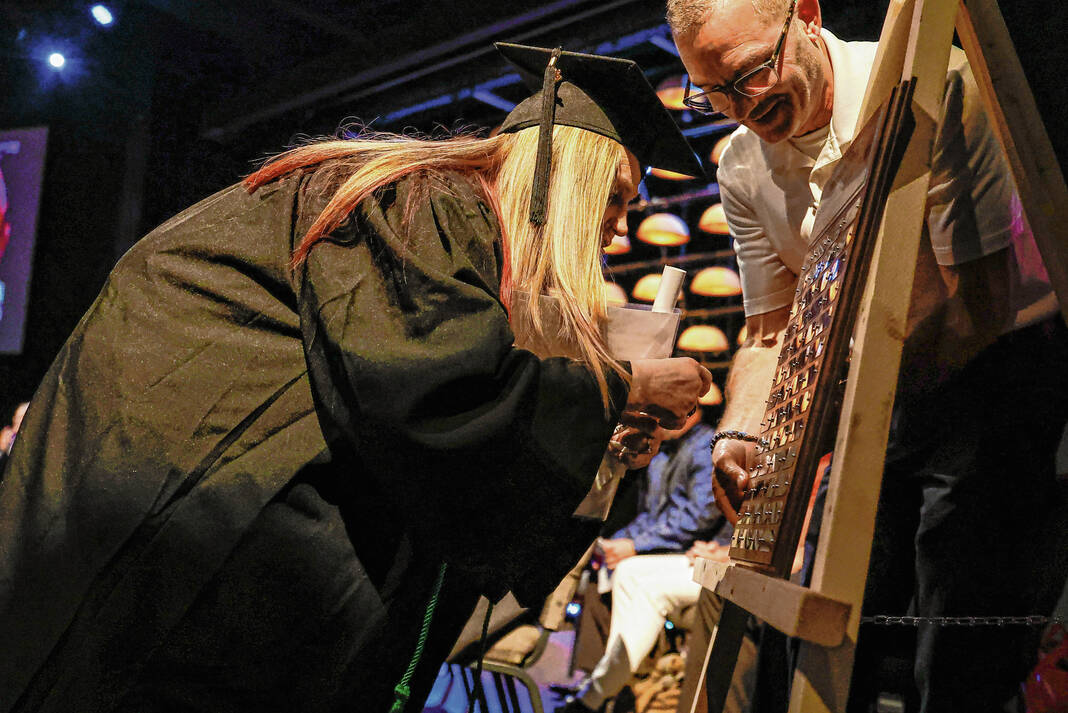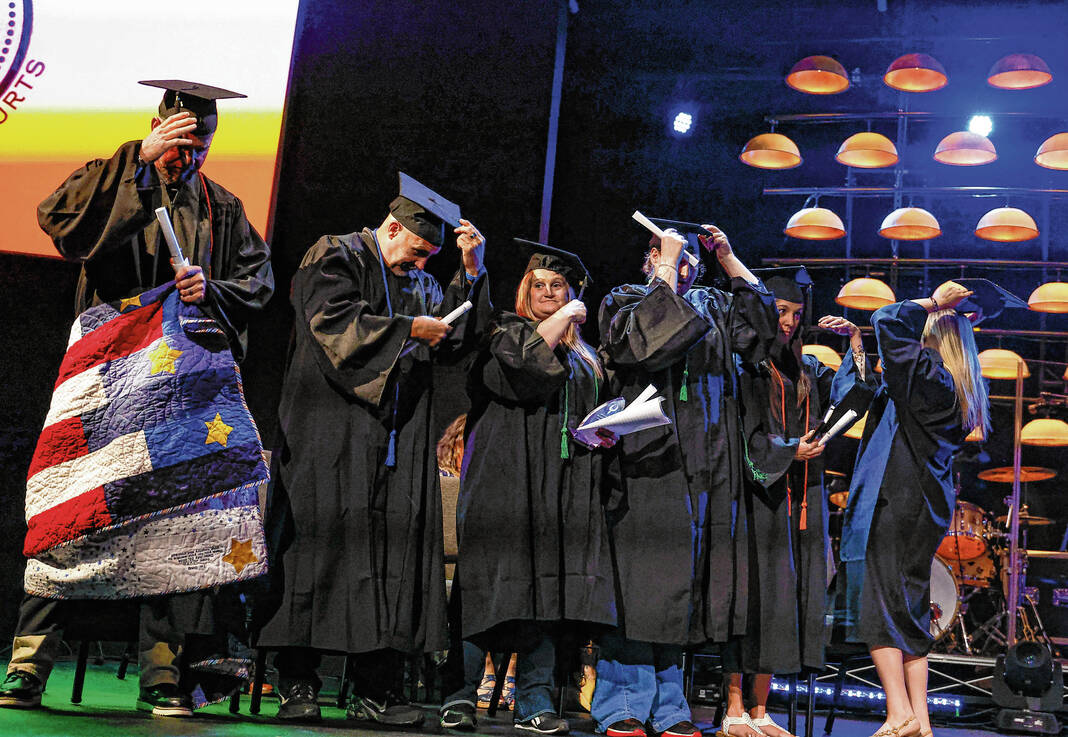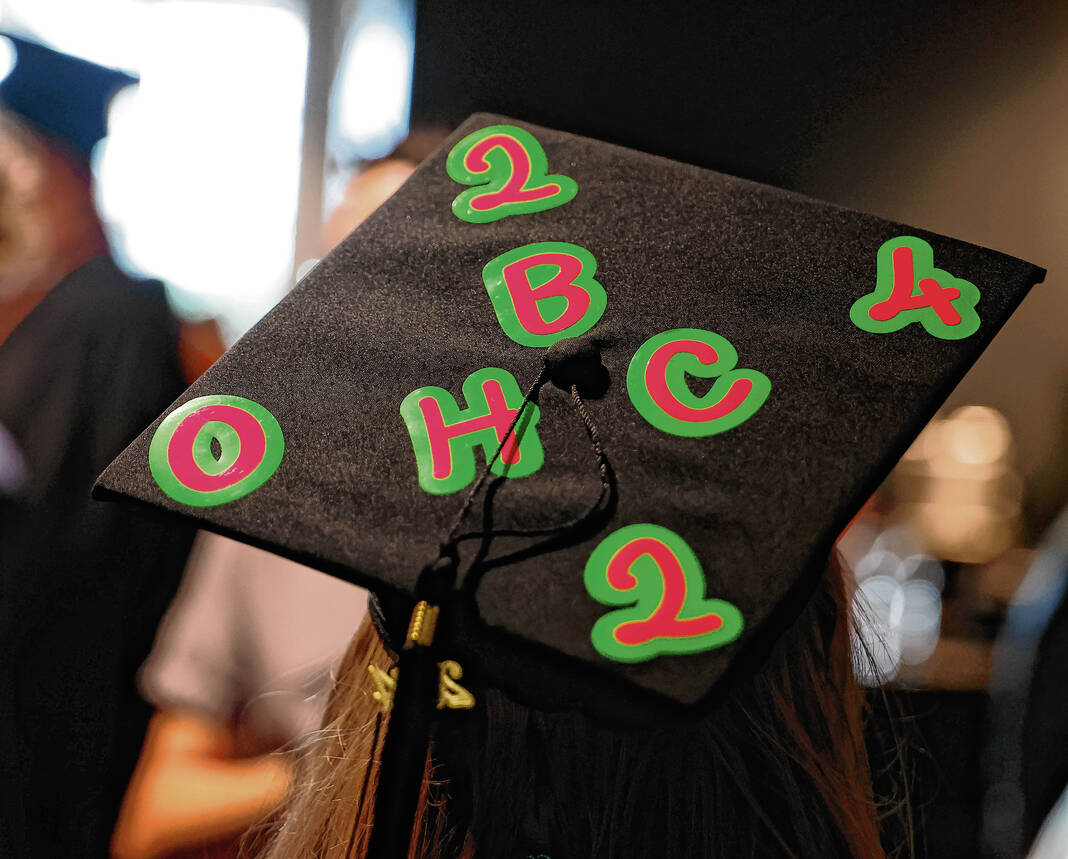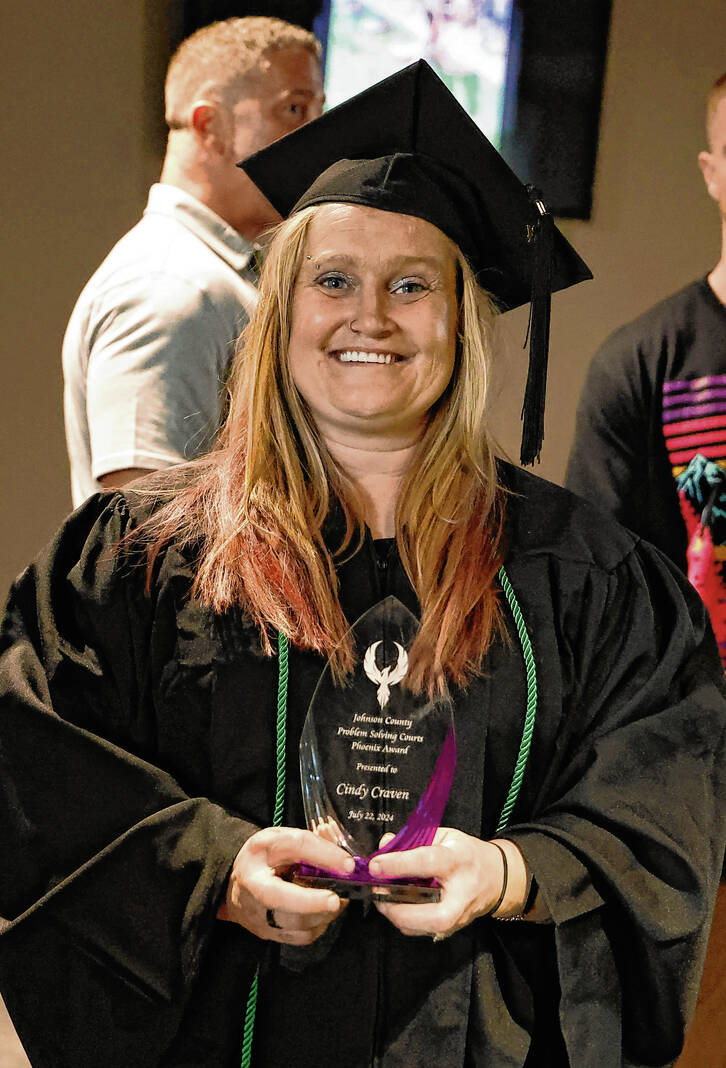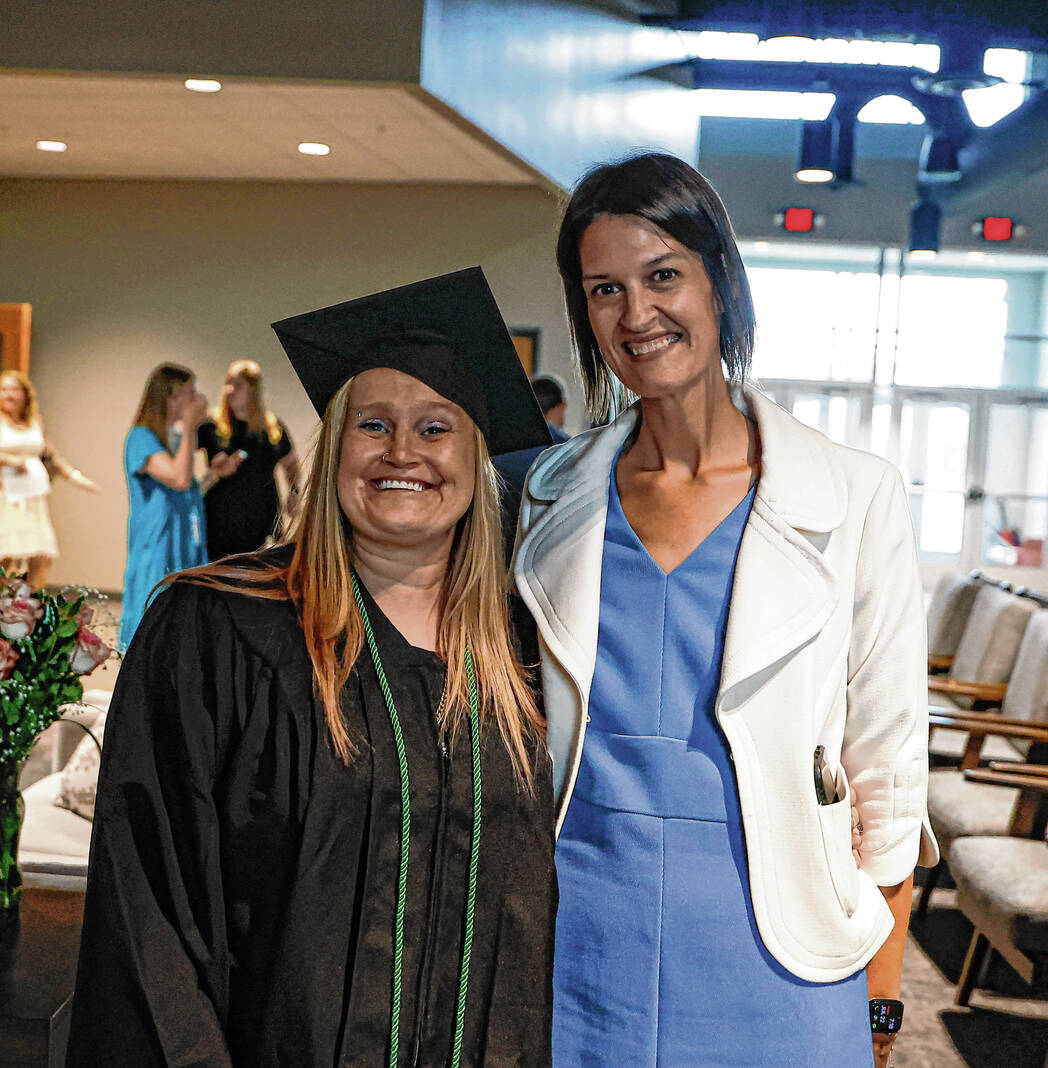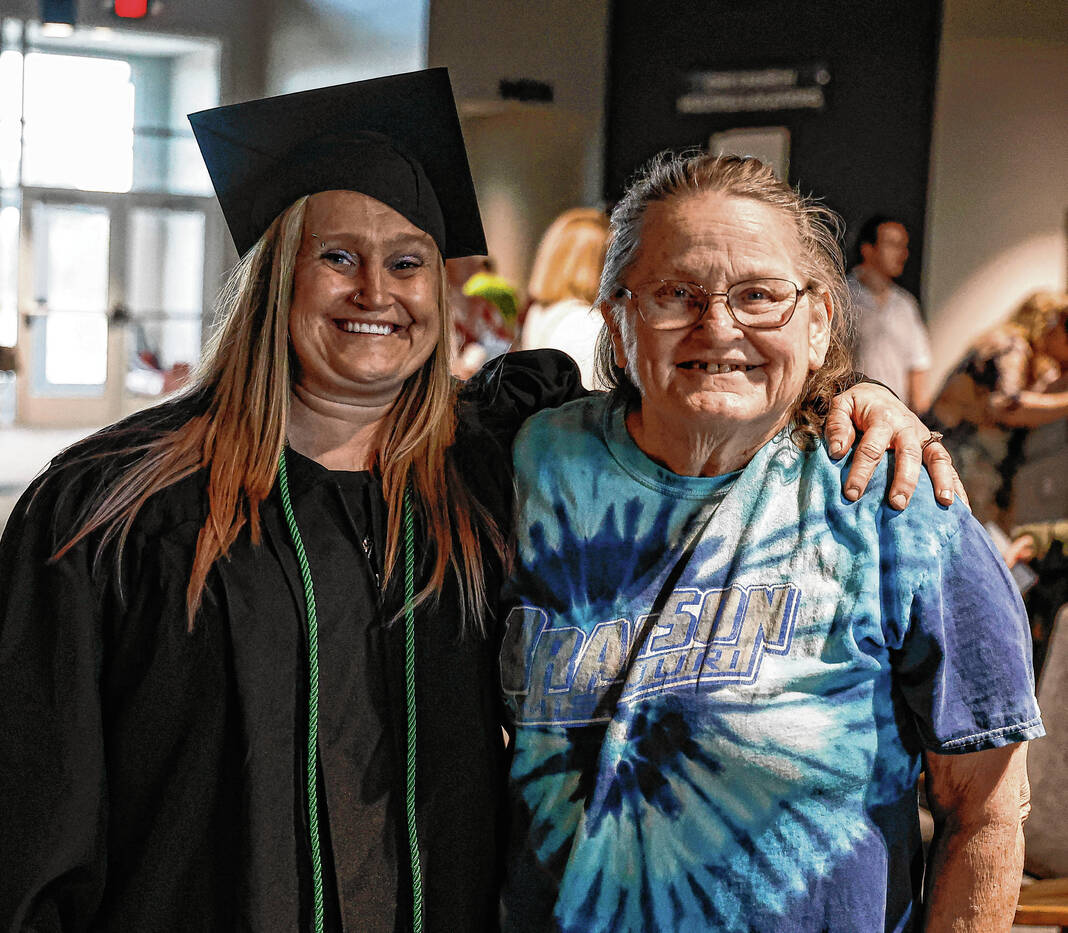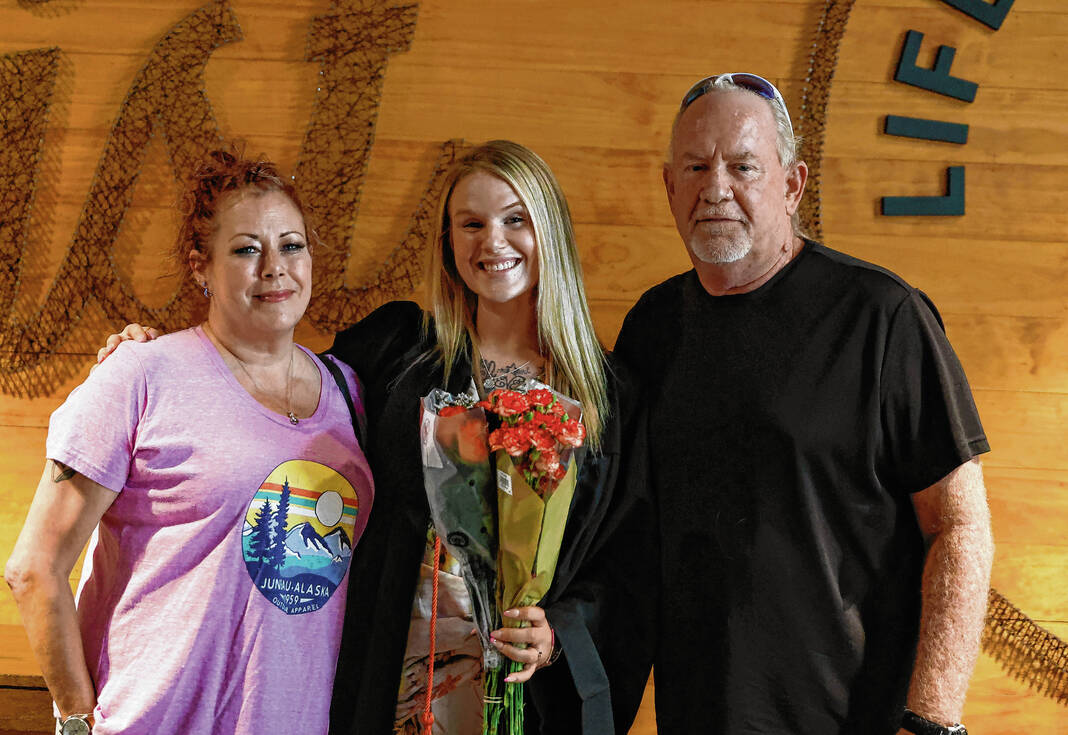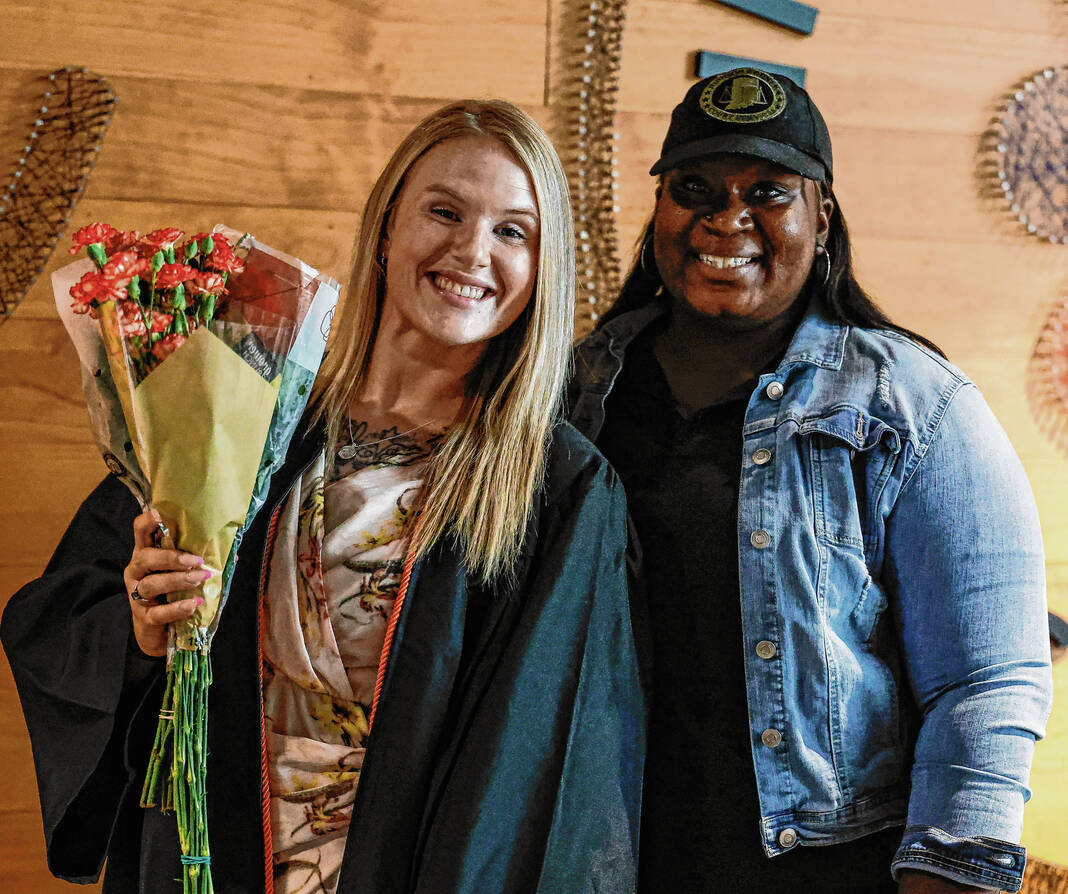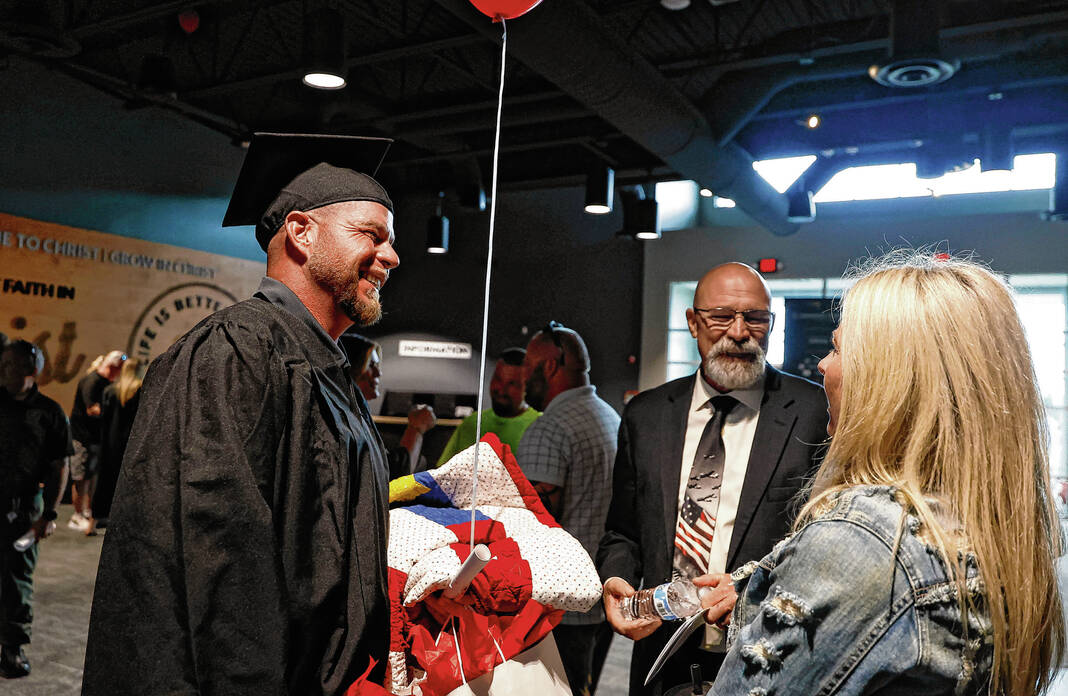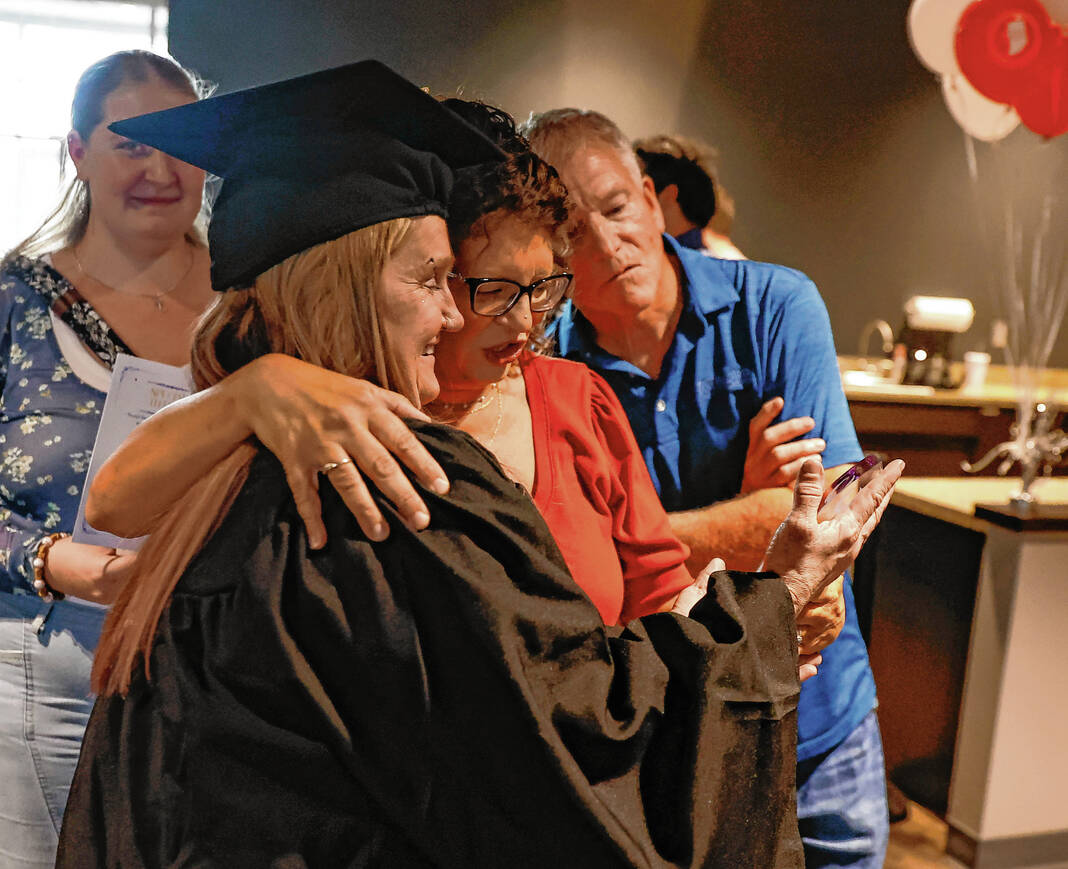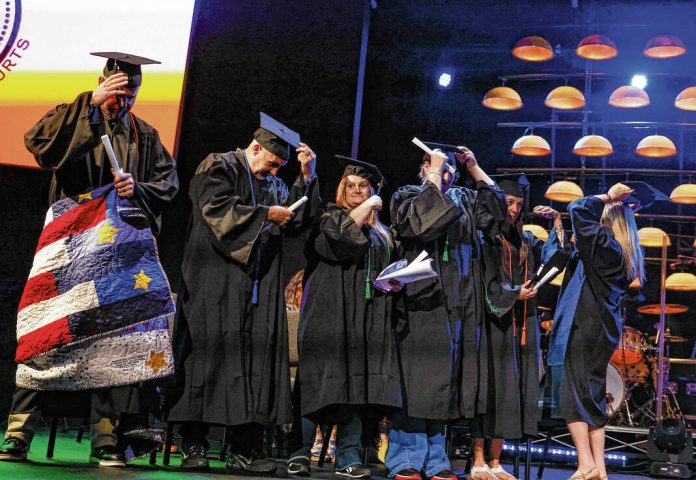
Problem-Solving Court graduates move their tassels to the left side of theirs cap at the conclusion of their graduation ceremony Monday at Emmanuel Church in Franklin. Rob Baker | For the Daily Journal
She sat composed on the stage as Johnson County court officials told her story of progress and resilience.
Donning a cap and gown, Cindy Craven listened as Probation Officer Shannon Barrick spoke of her exceptional progress in recovery to community members, court officials and other people in recovery. Then, her time had come as the 42-year-old Franklin mother received a new title — Behavioral Health Court graduate — and was beckoned across the stage to receive a certificate commemorating her achievement.
Craven knew she was one of the six participants graduating from her recovery program on Monday at Emmanuel Church in Franklin, but she did not expect what would happen a short time later. She was called across the stage for a second time as she was named the recipient of the prestigious Phoenix Award, an honor presented to a single court graduate who has demonstrated remarkable strength, resilience and bravery throughout their recovery journey.
She was shocked. But she had put in more than enough effort in her recovery journey, court officials said.
“It could be called the Phoenix Award or it could be called the elephant award because I gave her one heck of an elephant and she ate it,” said Brandi Foster Kirkendall, magistrate judge and supervising judge of the Johnson County Behavioral Health Court, one of the county’s problem-solving courts.
Johnson County has five problem-solving courts: re-entry, drug, behavioral health, juvenile drug and veterans. They are also designed to help offenders recover, address personal issues and reintegrate into society post-incarceration. Doing this is designed to benefit not only the involved individuals and their families, but their victims and society as well.
Six participants — Craven and Lisa Reese, Behavioral Health Court; Julianne Clark and Christina Carver, of the Drug Court; James Clark, of the Re-Entry Court; and Doug Wagner, of the Veterans Court — graduated from their respective programs Monday. They were joined by court officials, their families and the community to honor their achievements.
Challenging journey
Craven’s journey began nearly three years ago. She had been charged in August 2021 with two felony counts of battery against a public safety official, including causing injury, and a misdemeanor count of resisting law enforcement.
As Craven’s case was being adjudicated through the county court system, her attorney told her about the county’s Behavioral Health Court. It is designed to help offenders with behavioral health challenges or issues recover and reintegrate into society.
Craven thought it would be a good fit for her, she said.
“Considering I have mental issues, with depression and bipolar and everything, they thought it would be a good pick for me to go to,” she said.
She entered the program in July 2022. Going through the court was an experience unlike any Craven had gone through before.
Craven had to go to meetings with other court participants, staff and doctors, which was stressful at first, she said.
“I did take it one meeting at a time, one doctor at a time,” Craven said. “And it was just after that it gradually just got easier.”
Craven’s first year was filled with “strides and setbacks,” Barrick said. At one point, Kirkendall told Craven she had one week to show that she was invested in the program and getting better, Barrick said.
The challenge was accepted.
“Since that time, she has left nothing to chance,” Barrick said. “Today she walks with inner peace. She knows her worth and she’s exceeded her expectations.”
But Craven wanted more. Over the last 313 days, she attended 287 meetings — 152 more meetings than what was required. She wrote well-thought-out application sheets for every meeting she attended, and is now 35 months sober, Barrick said.
She’s also started two new recovery meetings in Franklin, Barrick said.
Rapid growth
Since the establishment of the first county-level problem-solving court in 2021 with the Re-Entry Court, the county has quickly expanded its efforts. This is because of the need for the programs, Kirkendall said.
The expanding courts also led to a change in how to celebrate the graduations earlier this year. In the past, each court had its own ceremony, but now they have a ceremony once a quarter to celebrate the accomplishments of the graduates from every court combined.
“It makes it a bigger accomplishment. I think it gives them something to really strive for,” Kirkendall said.
It also gives a sense of camaraderie among not only the graduates from each court, but for the non-graduating participants too. They are required to attend the ceremony so they can see others’ successes and strive for it themselves, she said.
Having graduations like this also opens it up to the public more, Kirkendall said.
“It’s very easy to say, ‘This is what we’re doing. We do these courts, we do these things,’” she said. “But this is a platform for the public to be able to come and see.”
Funding opportunities from the federal government have allowed court staff to add programming, therapists and even peer mentors. They have two full-time peer mentors and five part-time peer mentors who coach participants and help them as they recover and go through the program, Kirkendall said.
One of those mentors is Laney Cornett, who graduated from the Drug Court earlier this year. Cornett decided to become a mentor because of how the program changed her life.
“Anything I can do to give back to it. It’s really important to me,” Cornett said.
The Drug Court program provided her with the structure, therapy and support she needed. It helped build up her confidence for what she wanted to do in life, she said.
Last year, she opened Upstairs Basement, a boutique in downtown Franklin.
“Now I really just want to help other people get that same peace and happiness that I found,” Cornett said.
As a peer mentor, she meets with participants as a group and one-on-one to talk about what’s going in their lives. Mentors listen to their problems and help them come up with solutions to solve them, she said.
“One of my mentors recently got an apartment so I went and helped her get that furnished and helped her get that set up,” Cornett said. “Just all the little baby steps that we have to do to get our lives back.”
‘Changed my life’
On the cusp of her graduation, Craven felt great, more productive and very successful, she said. She liked being a part of the program, and even intends to become a peer mentor to help future offenders as they navigate the problem-solving courts.
“I owe a lot to the Behavioral Health Court. They really changed my life,” Craven said.
Through the court, staff was able to help Craven get to the right doctors and prescribers for her medication, along with getting her into therapy, she said.
“The way they went above and beyond to try and to get me in something I was comfortable in and everything was really great,” she said.
Court staff helped Craven when she was searching for a new job, telling her who was hiring and where she’d be able to walk to for work, as she had lost her license. A few months later, she was able to get her license back, thanks to the help of the court, she said.
“It’s very beneficial, and it will help you in recovery and it will help you in your life going forward,” Craven said.
Craven’s experience is what court officials hope for with participants. All of it is designed to help offenders gain stability while reducing recidivism, Kirkendall said.
“All of that helps the community because hopefully they’ve not been re-offending and they’re becoming dedicated members of the community,” Kirkendall said. “If they’re coming back to our community, we want them to come back in the best light.”
‘Anybody could do it’
At her graduation ceremony Monday, Craven’s appreciation for the court staff continued. She also thanked her mother and her daughter for their support as well, and apologized to the sheriff’s deputy she assaulted in 2021.
“I’m a changed person and have the utmost respect for you as a person,” Craven said.
She later quoted the mantra of the problem-solving courts when encouraging other participants to keep going.
“Remember to show up, work hard and be honest,” Craven said.
Craven encourages those who are unsure about taking part in the problem-solving courts to do so. They also shouldn’t give up when it gets difficult, she said.
“If you think it’s too much, you just got to put your whole mind and heart and soul into it,” Craven said. “Because if I could do it, anybody could do it.”
AT A GLANCE
Johnson County Problem-Solving Courts
Here’s a look at what each problem-solving court is designed to address:
Re-Entry Court: This court is for offenders who have spent time in the Indiana Department of Correction (IDOC) who have modified sentences to help them re-integrate into the community. It is supervised by Superior Court 2 Peter Nugent.
Drug Court: This court is similar to the Re-Entry Court, but is tailored more toward those with drug offenses and is an alternative to incarceration with the IDOC. It is supervised by Circuit Court Judge Andy Roesener.
Behavioral Health Court: This court is an alternative to IDOC for those who have behavioral health struggles and/or issues. It is supervised by Magistrate Judge Brandi Foster Kirkendall.
Juvenile Drug Court: This court is tailored for drug offenders under 18 years of age. It is supervised by Circuit Court Judge Andy Roesener and Juvenile Magistrate Judge Michael Bohn is associated.
Veterans Court: The county’s newest problem-solving court is tailored to veterans, providing veteran-specific resources. It is supervised by Superior Court 3 Judge Douglas Cummins.



